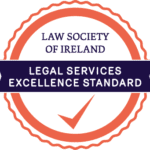You may have read some of our earlier blogs dealing with the subject in which we have outlined that children (usually adults at the time this issue comes up) have no automatic right to inherit from their parents.
This is the fundamental point to make before anybody enquires as to whether they have they basis of a case against their parent.
Today what the Courts are asked to do is interpret a piece of legislation from 1965 which reads
the parent failed in their moral duty to provide for the child.
Because there has been no change in this legislation it is left to the Courts to interpret what this means and set up a set of Principles to guide decisions. These have become known as the 18 Kerins Principles.
These were formulated by Judge Kerins in 2003 when he was president of the High Court and are still quite valid today some 20 years later.
The full 18 principles are outlined in the case of
XC v RT (2003) 2 IR 250 which can be found on Google.
The reality is that although the act mentions children all cases are taken by persons when they are adults and even have children themselves.
They may have an issue that they are either omitted from the will altogether or they feel their share if anything was given to them is not sufficient in comparison with other beneficiaries.
The Courts have decided to divide how they deal with these cases in 2 parts. Firstly they asked the simple question .
Is there a duty owed ?
If they answer that in the affirmative then they go on to consider what financial compensation should be awarded.
There is a high level of proof placed on the Applicant seeking to claim under this Section.
A lot of the principles set out above mean many hurdles have to be crossed by anybody thinking of taking a claim.
For example the section does not create an automatic obligation to leave something to each child.The provision of an expensive education may discharge any duty as may other gifts made during the lifetime of the parent.
The Courts have decided that their place is not to make an adequate provision but to provide proper provision and that can only be considering the deceased parents means.
In more modern cases the courts have looked into the financial well-being of the adult child. If they have prospered in their own lives financially they will have a more difficult case to bring claiming that the parent did not provide for them .
Every case turns on its own facts. There have been cases relating to farms. If a child is induced to believe that working on a farm they will ultimately become the owner of it and they shape their upbringing and life on that basis they would have a very strong case to succeed with a section 117 application.
It also should be noted that while courts have wide powers to make provision for the applicant it does not give them power to make a new will. Finally and perhaps most telling is that the courts will accept that parents know their children better than anybody and any decisions made in their Will may reflect this.
An interesting side point to the recent case law is that there is no provision for grandchildren bringing a claim. It merely provides for the children of the deceased as the sole parties who can lodge .
In summary
Consider these headings to guide you as to whether you have the basis of a successful claim.
Bear in mind that our firm will run through this checklist before we decide to accept instructions to take a case .
Has there been proper provision having regard to the means at death of the parent ?
Was any past payment made by the parent or anybody else to or on behalf of the applicant?
Was any provision at all made on death by the parent and if so is that sufficient given the family circumstances at that time ?
The age, financial position, earning capacity and prospects of the adult child.
The other obligations of the parent to provide for their spouse or other children and indeed their own parents if still alive ?
What’s called legitimate expectation of the child.
Other special circumstances either through illness or disability of the child which will require the court to make provision bearing that in mind.
The conduct of the applicant child.
The court can listen to any evidence about what the relationship was between the parent and the child from any third party giving evidence going to the central issues of the relationship . This might assist to determine why the parent decided as they did and would be relevant as part of the court decision.
If there’s anything in these rules and guidelines that you think relate to your personal circumstances please call us to discuss on a without obligation basis. Either call to arrange a consultation or send us an email in confidence to our info@michaelmonahansolicitor.ie address or a private letter by post. All will receive our immediate attention on receipt.


